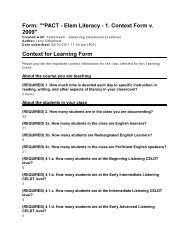The Tutoring Book - California State University, Sacramento
The Tutoring Book - California State University, Sacramento
The Tutoring Book - California State University, Sacramento
Create successful ePaper yourself
Turn your PDF publications into a flip-book with our unique Google optimized e-Paper software.
94<br />
Jamie Ferrando<br />
Kristina Kellermann<br />
Rexford Osei-Ansah<br />
Vu Tran<br />
Fall 2009<br />
Multilingual Students: Who <strong>The</strong>y Are, How <strong>The</strong>y Learn and How to Tutor <strong>The</strong>m<br />
Background of Multilingual Students at Sac <strong>State</strong><br />
(by Vu Tran)<br />
A lot of native speakers are unaware of the complexity of speaking and writing in two languages.<br />
Becoming fluent in one language is a difficult task alone, but to become fluent in two languages is even<br />
more difficult. Recent research shows that it takes more than 10 years to become academically fluent in a<br />
second language. Many native speakers view the grammatical errors of multilingual students’ writings at<br />
the university level as something that is a deficiency, and not a unique process. In fact, one can say that it<br />
is an accomplishment for multilingual students to have made it this far academically.<br />
Speaking and writing English has never been a strong skill for me while growing up (for most of<br />
my life) in an impoverished neighborhood filled with street violence, gangs, crimes, and poverty. I, along<br />
with other immigrant children in my neighborhood, suffered from the perennial condition of not having<br />
enough food, clothes, and resources available in order to maintain good hygiene and function sufficiently<br />
on a daily basis. Consequently, education took a toll on me and became secondary to my human basic<br />
survival needs (e.g. food, clothes, and immediate resources). My parents’ primary objectives were to<br />
work and bring money home to feed and clothed us. However, even that became a dilemma, for the<br />
language barrier immensely hindered their progress to acquire a decent job position. <strong>The</strong>y would often<br />
work as menial farm laborers, custodians, and janitors; jobs that required long hours per day and paid<br />
appallingly minuscule in return. <strong>The</strong> thought of overcoming this poverty-stricken situation, coupled with<br />
learning a second language in alien environment, was nearly impossible.<br />
<strong>The</strong> education that I had received during my high school years did awfully little to help ease my<br />
deprived circumstance at home. During my senior year, I began asking myself questions like: Did<br />
learning about grammar rules help provide food and clothes for my family? Did writing an essay about<br />
endangered species provide my family the resources we need to survive at home? My family was still in<br />
dire condition, prone to violence, crimes, and poverty that prevented us to climb up the socio-economic<br />
ladder. However, with my parents “nagging” at me constantly about the importance of education, I knew<br />
that graduating from high school and attending college was not a choice, but obligatory, and the only<br />
means of overcoming our impoverished situation. <strong>The</strong>refore, the need to speak and write fluently in<br />
English at the <strong>University</strong> level became a means to an end for me.<br />
Many of the multilingual students at Sac <strong>State</strong> are experiencing this dilemma as we speak. <strong>The</strong>y<br />
come from a diverse range of linguistic, cultural, economic, and educational backgrounds. I recently<br />
conducted a study in several of the multilingual classes here at Sac <strong>State</strong>, and found out that many of the<br />
students were either 1.5 generation or immigrants coming from different cultural, economic and<br />
educational backgrounds in various cities across <strong>California</strong>. Many of them shared similar experiences and<br />
outcomes. Based on the questionnaire, they view their writings thus far at the university level as more of<br />
an accomplishment than a deficiency, and that teachers/tutors should be amazed by what they can do in<br />
two languages, rather than what they cannot do. Out of all the multilingual students that I have tutored<br />
throughout the semester in the writing center, there was one that truly made me appreciate how beautiful<br />
and gifted multilingual students are. I was not only amazed by the tutee’s ability to write in English at the<br />
university level, but was even more astonished by the fact that English was his fifth language. He told me

















